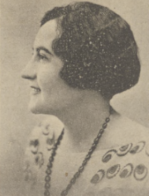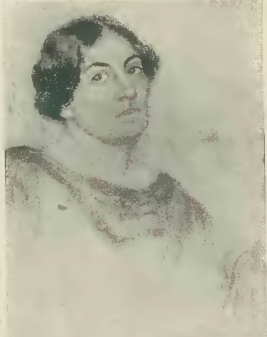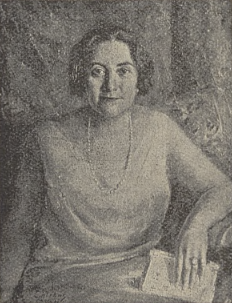 |
Date of Birth |
1881-00-00 | |||
| Place of Birth | Oknica | ||||
| Date of Death | 1944-08-03 | ||||
| Place of Death | Warszawa | ||||
| Pseudonym and cryptonym | A.W.; aw ; aw.; ER; Ge; Ge...; GE; GE...; Li; Malibran; RE; RE.; Zygmunt Przerębski |
||||
| Familiar relationshps | 1 voto - Rybakiewicz; 2 voto - Kropatsch; 3 voto - Parandowska |
||||
| VIAF ID | 6451151778229318130009 | ||||
| Public Domain: In: „Świat Kobiecy” 1929, nr 16, s. 354-355. |
Aurelia Wyleżyńska was a writer; publicist; propagator of Polish culture; social activist; author of many articles about women, culture, and education, for which the role of women was important in society at that time. She was born in 1881 in a small town on the outskirts called Oknica, located in the Podolia Governorate territory. She was one of 6 children. Her father was Ludomir Ludwik Wyleżyński (1846-1914) and her mother Kamilla (1850-?) from the Połtowiczów family. She descended from an intellectual landowning elite, and was the descendent of the old Wyleżyński family, identifiable by the Trzaska coat of arms, whose first mentions can be found in the 16th century armorials. After completing high school in the name of Cecylia Plater-Zyberkówna in Warsaw, she continued her education in Krakow at the Wyższe Kursy dla Kobiet im. A. Baranieckiego (Higher Courses for Women in the name of A. Baraniecki School), and was later accepted into the Faculty of Philosophy at the Jagiellonian University. At first, she was just an observer, but later became an enrolled student. During this time, she married Tadeusz Marian Rybakiewicz (1879-1910), who was a teacher at a middle school in Krakow and Wadowice. He died at age 31. During her studies, Wyleżyńska had lectures on Polish literature and seminaries, and graduated in 1911. During her academic education, she debuted in 1909 with her literary draft O “Róży” Katerli (About “The Rose” of Katerla), which was published in the columns of the newspaper Prąd (columns 10/11) and dedicated to Róży (The Rose) by Stefan Żeromski. A year later, she published a correspondence from Krakow entitled Echa dni grunwaldzkich (Echos of The Grunwald Days) which was dedicated to the 600th anniversary victory celebration of the battle of Grunwald (located in columns 7/8). Wyleżyńska’s second husband was Adam Kropatsch (1884-1971), who was a philosopher, publicist and teacher. Her third husband was Jan Parandowski. After her divorce, she left Poland in 1923 and went to Paris where she stayed for about a dozen years. She was charmed by the capital of France and remained there until the end of her life, despite many vacations to other countries; including Italy, Spain, Germany and Austria. For her, Paris never lost its charm, and brought her serenity and hope in difficult times. She devoted a novel to Paris entitled Czarodziejskie miasto (The Magical Town, 1928) about autobiographical traits. She actively participated in Polonia (Polish people living abroad) life in Paris by opening a literary salon in her own apartment on the rue de Navarre, participating in readings of post-war Polish literature on the Paris Sorbon, sending articles and correspondence to the Krakowian Presses Bluszcz, Świat Kobiety, Wiadomości Literackie, Lwowskie Wiadomości Muzyczne i Literackie, Tygodnik Ilustrowany, Kobieta Współczesna, and to the weekly published in the French language in Warsaw Le Messager Polonais (1925-1928). She was a conveyor of Polish culture who was infected by different environments, but she understood the broadening of national culture as attracting others to it. Wyleżyńska also participated in the activity of the French company Les Amis de la Pologne by releasing La Pologne in a magazine published by that very company, as well as in the parisian press. Her talks were also noticed and recognized in the Polish press in the krakowian weekly Nowości Ilustrowane. Wyleżyńska never neglected her work in literature. She also wrote and released the novels U złotych wrót (Within the golden gates, 1922), Niespodzianki (Surprises, 1924), Księga udręki (Volume of Anguish, 1926). Biała czarodziejka (The White Witch, 1926), a study on Maria Kalergis, Serce podzielone na ćwierci (A Heart Divided into Fourths, 1931), Maria Leszczyńska na dworze wersalskim (Maria Leszczyńska in The Versailles Court, 1935) volumes 1 & 2, and the aforementioned Czarodziejskie miasto. For Niespodzianki, the author won a third-place Gabriela Zapolska award in 1924. In 1937, she returned to Poland and lived permanently in Warsaw, continuing her literary and publicist work. During hitlers occupation, she worked at a hospital in Warsaw, led charactive activity and tended to the wounded and needy, taught the doctors French, and was a translator. She died during the Warsaw Uprising on August 3rd, 1944 and was buried in the Powązkowski Cemetery.
Aurelia Wyleżyńska was well educated, ambitious, and did not fit in with the modern branches of customs; especially in the role of a feminine part of society in a patriarchal world. She equally grew accustomed and settled down in Krakow, Lviv, Warsaw and Paris. The topic of her works caused a rise above the average within the female representatives of the beautiful gender: Narcyza Żmichowska, Maria Leszczyńska, Maria Kalergis, and Zofia Węgierska. Similarly, the fictitious female protagonists of her stories, seemingly fragile; short-lasting and docile, turn out to be strong females in the end, who do not subjugate themselves to the pressures of their surroundings. From the harshest of experiences, they know how to extract certain knowledge for further development. Finally, they become advocates for change. Wyleżyńska was a modern emancipator in the best sense of the word, and with this she was able to preserve a child-like sensitivity of observing the world.
WORKS
Manuscripts
[Artykuły i szkice literackie z okresu okupacji niemieckiej 1940-1943], [Incipit:] Gloria Victis, Rękopis.
[Dziennik z lat 1939-1940], Rękopis.
[Dziennik z lat 1939-1943], Rękopis.
[Dziennik] : [wrzesień 1943 do 29 czerwca 1944], [Incipit: Venti Settembre], Rękopis.
Andre Malraux, „Sygnały”, 1936, nr 22, s. 5.
Andrzej Strug, „Sygnały”, 1938, nr 38.
Artystka – żona poety (Celina Szymanowska Mickiewiczowa), „Bluszcz”, 1933, nr 30.
Astronom zawinił, a szewca zabrali, „Nowy Dzień”, 1943, nr 544.
Aurel, feministka miłości, „Bluszcz”, 1932, nr 28.
Baby podolskie, „Świat Kobiecy”, 1928, nr 7, s. 145-146.
Barbusse i Gide, „Sygnały”, 1936, nr 19, s. 1.
Biała Czarodziejka, Warszawa, "Rój", [1926], 1929.
Bilans roczny, „Bluszcz”, 1931, nr 43.
Błękitna nuta. Fragment z pracy: „W mieście świata polskie ścieżki“, „Bluszcz”, 1930, nr 50-51, s. 14.
Boy – optymista, „Świat Kobiecy”, 1929, nr 8, s. 167-168.
Chciałabym leżeć na Powązkach, „Bluszcz”, 1932, nr 44, s. 10.
Ci, co pozostali (od specjalnej korespondentki), „Bluszcz”, 1930, nr 35, s. 10-11.
Ci, co wyjechali na srebrne wybrzeże, „Bluszcz”, 1931, nr 35, s. 7-8.
Co przynosi szczęście?, „Świat Kobiecy”, 1927, nr 10, s. 209.
Córka Mandaryna, „Świat Dziewcząt", 1933, nr 15.
Cudny Paryż, „Bluszcz”, 1935, nr 32.
Cyprian Norwid (w 50. rocznicę zgonu), „Bluszcz”, 1933, nr 20.
Czarodziejskie miasto: powieść, Warszawa, Dom Książki Polskiej, [1928].
Czekanie, „Świat Kobiecy”, 1927, nr 6, s. 111, 118.
Człowiekowi naprzeciw (Od specjalnej korespondentki), „Bluszcz”, 1930, nr 46, s. 8-10.
Deuil [Stanisława Jarocińska-Malinowska], „La Femme Polonaise”, 1938, nr 4, s. 16.
Dramat wyobraźni, „Bluszcz”, 1934, nr 31, s. 957.
Dwa bale w Operze, „Świat Kobiecy”, 1931, nr 2, s. 22-23.
Dwie mody, „Bluszcz”, 1923, nr 5.
Dwór w filmie 90%, „Bluszcz”, 1934, nr 36, s. 1115-1117.
Dzień Święta Narodowego w Paryżu, „Świat Kobiecy”, 1926, nr 18, s. 347.
Dziewczynka z Igloo, „Świat Dziewcząt", 1933, nr 8, s. 6-7.
Echa dni grunwaldzkich, „Prąd”, 1910, nr 7/8.
Echa ze świata, „Echo Literacko-Artystyczne”, 1913, nr 13, s.1299-1302.
Emigranci o sobie, „Bluszcz” 1939 nr 18.
Eugenjusz Delacroix, „Echo Literacko-Artystyczne”, 1914, nr 2, s. 99-102.
Filozofka wersalska, „Świat Kobiecy”, 1930, nr 6 s. 116-117.
Giacomo Leopardi. Poezje, „Dziennik Ludowy”,1938, nr 147.
Gloria Victis!, „Nowy Dzień” 1943, nr 564.
Głosy w powietrzu - Zygmuntowi Lityńskiemu, „Świat Kobiecy”, 1932, nr 4, s. 62.
Gorące kasztany, „Bluszcz”, 1930, nr 52, s. 9.
Harnasie w Operze Paryskiej, „Bluszcz”, 1936, nr 20.
Herminia Naglerowa, „Świat Kobiecy Record”, 1930, nr 4, s. 66.
Idealne mieszkanie I, „Rekord Świat Kobiecy”, 1926, nr 19, s. 373.
Idealne mieszkanie, „Rekord Świat Kobiecy”, 1926, nr 20, s. 388-389.
Ilustrowany przewodnik dla wychodźców we Francji, współaut. H. Staniszewski, Paryż, Druk. Polska, 1925. Izabela Zbiegniewska, ostatnia entuzjastka, „Bluszcz”, 1934, nr 29, s. 895.
Jaskółki wolności, „Bluszcz”, 1930, nr 48, s. 16-17.
Jean Cassou, „Sygnały”, 1936, nr 20, s. 3.
Jean Guehenno, „Sygnały”, 1936, nr 28, s. 8-9.
Jeszcze nie koniec legendy, „Comoedia”,1926, nr 14, s. 1.
Kobieta bez wieku, „Rekord Świat Kobiecy”, 1925, nr 10, s. 218-219.
Kobieta wczoraj, dziś i jutra, „Świat Kobiecy”, 1928, nr 21, s. 453-454.
Kongres, „Świat Kobiecy”, 1930, nr 13, s. 295; nr 14, s. 321.
Królestwo smakoszów, „Rekord Świat Kobiecy”, 1924, nr 13, s. 274-275.
Królewiec, „Ziemia”, 1913, nr 1, s. 5-7; nr 2, s. 20-22; nr 3, s. 37-39.
Kwiaty pod stopy pomnika…, „Świat Kobiecy”, 1929, nr 12, s. 259.
Kroniki wojenne. T. 1, 1939-1942, oprac. G. Pawlak, M. Urynowicz, Warszawa, Państwowy Instytut Wydawniczy, 2022.
Kroniki wojenne. T. 2, 1943-1944, oprac. G. Pawlak, M. Urynowicz, Warszawa, Państwowy Instytut Wydawniczy, 2022.
"Księga udręki" : powieść, Warszawa, skł. gł. w Księgarni Gebethnera i Wolffa, 1926.
Leon Bakst, „Rekord Świat Kobiecy”, 1925, nr 6, s. 128-129.
List z Paryża, „Kurjer Lwowski”, 1926, nr 84, s. 3.
Madame Gyp, „Bluszcz” 1932 nr 29.
Malibran, szczęśliwy rywal, „Świat Kobiecy”, 1930, nr 8, s. 165.
Marja Leszczyńska na dworze wersalskim, z przedm. S. Wasylewskiego, Poznań, Wydawnictwo Polskie, 1923.
Marja Leszczyńska na dworze wersalskim. T. 1, Poznań, [s.n.], 1935.
Marja Leszczyńska na dworze wersalskim. T. 2, Poznań, [s.n.], 1935.
Mauriac - pisarz katolicki, „Sygnały”, 1936, nr 32, s. 7-8.
Misterjum pogrzebu, „Sygnały”, 1938, nr 38, s. 11.
„Misterium pogrzebu", [In:] Wspomnienia o Andrzeju Strugu, wstęp i oprac. S. Sandler. Warszawa, Państwowy Instytut Wydawniczy, 1965, s. 283-287.
Między dolną a górną Warszawą, „Stolica”, 1939, nr 11-12, s. 4.
Między skrzydlatą myślą a przyziemnym czynem, „Bluszcz” 1931, nr 4.
Miniaturowa ambasada*, „Bluszcz”, 1931, nr 1, s. 7-8.
Myśli Marii Leszczyńskiej, „Bluszcz”, 1924 nr 15, s.197-198.
Na bezludnej wyspie. Pani Dr. Marji Klimowiczowej, „Świat Kobiecy”, 1927, nr 19, s. 429.
Na marginesie rewolucji rosyjskiej, „Placówka”,1919, nr 18, s. 15.
Na paryskim bruku, „Bluszcz”, 1934, nr 15, s. 458-459.
Nad Narwią, „Bluszcz”, 1934, nr 27, s. 822-823.
Nad Narwią. III. Rzeka, „Bluszcz”, 1934, nr 28, s. 854-855.
Nad srebrnem wybrzeżem, „Świat Kobiecy”, 1928, nr 4, s. 70.
Nagroda Ronsarda i pani de Noailles, „Rekord Świat Kobiecy”,1925, nr 7, s. 152.
Narcyza Żmichowska w świetle swych zwierzeń, „Przewodnik Naukowy i Literacki”, 1919, z. 9, s. 847-857.
Narcyza Żmichowska w świetle swych zwierzeń, (Ciąg dalszy), „Przewodnik Naukowy i Literacki”, 1919, z. 10, s. 951-962.
Narcyza Żmichowska w świetle swych zwierzeń, „Przewodnik Naukowy i Literacki”, 1919, z. 11, s. 1075-1085.
Narcyza Żmichowska w świetle swych zwierzeń.(Dokończenie części pierwszej), „Przewodnik Naukowy i Literacki”, 1919, z. 12, s. 1195-1208.
Niebezpieczne dzieci, „Nowy Dzień”, 1943, nr 549.
Nierozwiązane zagadnienia, „Świat Kobiecy”, 1928, nr 14, s. 314.
Niespodzianki, Lwów, "Lektor" Instytut Literacki, 1924.
Nieznany portret Chopina, „Tygodnik Illustrowany”, 1930, nr 30, s. 623.
Noc ognia i wody, „Rekord Świat Kobiecy”, 1925, nr 17, s. 391.
Nowe miasto, „Bluszcz”, 1934, nr 48, s. 1497-1499.
O kobiecie rosyjskiej, „Na Posterunku”.1918, nr 35.
O „Róży” Katerli, „Prąd”, 1909, nr 10/11.
Olga Boznańska, „Bluszcz”, 1934, nr 20, s. 603-604.
Ostatnia przeprowadzka, „Rekord Świat Kobiecy”, 1925, nr 14, s. 320-321.
Pacyfista przechodzi do roli czynnej, „Wymiary”, 1939, [nr] 12, s.97-98.
Paryż a Warszawa, „Świat Kobiecy”, 1929, nr 5, s. 101.
Paryżaneczka, „Świat Dziewcząt", 1933, nr 6.
„Pierwsza krew”, „Świat Kobiecy”, 1930, nr 2, s. 21.
Pierwszy zbiór anegdot w Podziemnej Polsce, „Nowy Dzień” 1943, nr 539 oraz Szarota T., Konspiracyjna broszura „Anegdota i dowcip wojenny” (1943) oraz jej twórcy, „Dzieje Najnowsze” 2023, T. 55, nr 2, s. 113–146.
Pieśń o żołnierzu żydowskim, „Wiadomości Literackie” 1931, nr 29, s. 2.
Pochwała samotności. Fragment z „Czarodziejskiego Miasta, „Trzeci Almanach Życia Kobiecego”, 1928, s. 56-62.
Pod kopułą „nieśmiertelnych”, „Comoedia”, 1926, nr 9, s. 3.
Pod Łukiem Triumfalnym, „Płomyk”, 1935, 1935, nr 13, s. 346-348.
Polskie dzieci w portretach Vigee Lebrun, „Bluszcz”, 1928, nr 30, s. 11-12.
Półuśmiech przypadku, Dopisek do poprzedniego, jeszcze niewysłanego listu Rity, „Świat Kobiecy”, 1929, nr 5, s. 104-106.
Prawa człowieka pracy do wypoczynku (Korespondencja własna „Echa Społecznego"), „Echo Społeczne”, 1936, nr 18, s. 2.
Prawda pocałunku. Nowela 1, „Świat Kobiecy”, 1928, nr 15, s. 333-334.
Prawda pocałunku. Nowela 2, „Świat Kobiecy”, 1928, nr 16, s. 353-354.
Prawda pocałunku. Nowela 3, „Świat Kobiecy”, 1928, nr 17, s. 373-374.
Prawda pocałunku, „Świat Kobiecy”, 1928, nr 18, s. 394-396.
Procesja, „Świat Kobiecy”, 1932, nr 6, s. 97-98.
Profesor i słuchaczka, „Świat Kobiecy”, 1932, nr 9, s. 188.
Próba pokojowego rozbrojenia świata (Korespondencja własna „Echa Społecznego" z Francji), „Echo Społeczne”, 1936, nr 20, s. 6.
„Przeciw wojnie z Czerwonym Krzyżem” na wielkiem zgromadzeniu w Paryżu, „Robotnik”, 1936, nr 22, s. 2.
Przed czterema laty. (Wspomnienia z lat niewoli i wygnania), „Nowa Polska”, 1919, nr 25.
Przykładne dwużeństwo, „Bluszcz”, 1935, nr 44.
Ryszard Berwiński : studyum, Kraków, Księgarnia Gebethnera i Sp., 1913.
Serce podzielone na ćwierci : powieść, Paryż, Librairie Franco-Polonaise & Étrangère, Warszawa, Gebethner & Wolff, 1931.
Spadkobierca dobroci. (W pierwszą rocznicę zgonu Józefa Mickiewicza), „Tygodnik Ilustrowany” ,1939, nr 34.
„Spaliliśmy świętą“ (od specjalnej korespondentki), „Bluszcz”, 1931, nr 24, s. 10-11.
Spotkania, „Bluszcz”, 1934, nr 31, s. 952-953.
Spowiedź wielkanocna, „Sygnały”, 1934, nr 10-11, s. 16. (Fragment z powieści mającej się wkrótce ukazać p.t. „Nieporządek świata“).
Sprawa Montherlata. Do redaktora Sygnałów, „Sygnały”, 1938, nr 46, s. 7.
Stasiowa, Felkowa i Karolkowa, „Bluszcz”, 1934, nr 29, s. 894.
Sylwetki dwóch artystek: Anny Bilińskiej i Marii Barszlicew, „Bluszcz”, 1929, nr 11.
Śmierć Anatola France’a, „Rekord Świat Kobiecy”, 1924, nr 15, s. 324-325.
Świat w ręku Heroda, „Dziennik Ludowy”, 1938, nr 366.
Święcone u Basałyków, „Świat Kobiecy”, 1930, nr 8, s. 168-169. (Fragment z książki: „W mieście świata polskie ścieżki”).
Święcone w Hotelu Lambert, „Świat Kobiecy”, 1927, nr 8, s. 153-154.
Tjandi z cyklu „Dziewczęta całego świata", „Świat Dziewcząt", 1933, nr 9, s. 14-15.
Technika Paryża, „Bluszcz”, 1937, nr 33.
Temperatura dłoni, „Bluszcz”, 1935, nr 7, s. 188-189.
Trucizna, „Bluszcz”, 1935, nr 11, s. 322-323.
Trzy spotkania, „Świat Kobiecy”, 1930, nr 5, s. 103-104.
U nas i u was. Oblicze Azji sowieckiej, „Bluszcz”, 1934, nr 30, s. 923.
U złotych wrót : powieść, Lwów, Księgarna Wydawnicza H. Altenberga, [1922].
Udoskonalone radjo. „Świat Kobiecy”, 1929, nr 2 + dod., s. 21.
W dzień Bożego Narodzenia, „Świat Kobiecy”, 1927, nr 24, s. 538.
W Jaworzu, „Bluszcz”, 1934, nr 1, s. 9-11.
W mieście świata polskie ścieżki,, il. W. Ossecki, Poznań, [s.n.], 1931.
W paryskiej Sofjówce I. Za kratami i wśród kwiatów, „Bluszcz”, 1931, nr 5, s. 6-7.
W paryskiej Sofjówce II. Na rozdrożu, „Bluszcz”, 1931, nr 6, s. 6-7.
W paryskiej Sofjówce III. Sofos Jasna, „Bluszcz”, 1931, nr 9, s. 7-8.
W paryskiej Sofjówce IV. „Pisz na Tauenzienstrasse 69“, „Bluszcz”, 1931, nr 10, s. 6-7.
W paryskiej Sofjówce V. Na lotnym piasku, miotanym przez burze… „Bluszcz”, 1931, nr 11, s. 8.
W paryskiej Sofjówce VI, „Bluszcz”, 1931, nr 12, s. 8.
W paryskiej Sofjówce VII. Polska Pani Girardin, „Bluszcz”, 1931, nr 16, s. 7-9.
W paryskiej Sofjówce. Łabędziowe filiżanki, „Bluszcz”, 1931, nr 21, s. 6-7.
W paryskiej Sofjówce. Łabędziowe filiżanki 2, „Bluszcz”, 1931, nr 22, s. 6-7.
W paryskiej Sofjówce. „Garçon, une glace vanille!“, „Bluszcz”, 1931, nr 26, s. 8-9.
W paryskiej Sofjówce. Garçon, une glace vanille! „Bluszcz”, 1931, nr 27, s. 6-7.
W paryskiej Sofjówce. Na fontannie położony listek, „Bluszcz”, 1931, nr 41, s. 10-12.
W paryskiej Sofjówce. Odszedł poeta… „Bluszcz”, 1931, nr 42, s. 7-9.
W paryskiej Sofjówce. Prunelowe pantofelki, „Bluszcz”, 1931, nr 17, s. 7-8.
W paryskiej Sofiówce. Śmierć czcigodnego pana Joachima, „Bluszcz” 1932 nr 3, 4; „Bluszcz”, 1933 nr 36 (nr specjalny pośw. Janowi III Sobieskiemu).
W paryskiej Sofjówce. Trzeci Maj, „Bluszcz”, 1931, nr 18, s. 8-9.
W Polsce – u pani starościny, „Bluszcz”, 1934, nr 2, s. 43.
W sercu i w niezagasłej myśli, „Bluszcz”, 1932, nr 18, s. 9-10.
W szkole analfabetów. (Na uchodźstwie), „Mały Światek”. 1918, nr 17.
Warszawa po latach siedemdziesięciu. Krzyż Traugutta, „Bluszcz”, 1933, nr 4, s. 6-7.
Warszawa po stu latach, „Bluszcz”, 1933, nr 2, s. 7.
Warszawa po stu latach II. Głosy podwórza, „Bluszcz”, 1933, nr 3, s. 7.
Wiem, że mój okręt do kraju płynie…, „Świat Kobiecy”, 1928, nr 20, s. 431.
Wiosna w Hiszpanji. Patrzyć na obrazy Vincente Mulet, Palais de Marbre – Paryż, „Bluszcz”, 1931, nr 20, s. 4-6.
Włoska pantomima futurystyczna (Italian Futuristic pantomime), “Wiadomości Literackie”, 1927, no. 35, s. 2.
Wpływ pani Hańskiej na twórczość i życie Balzaca, „Bluszcz”, 1934, nr 33, s. 1014-1016.
Wyspa szczęśliwości, „Świat Kobiecy”, 1931, nr 16, s. 360.
Wystawa dekoracyjna w Paryżu, „Rekord Świat Kobiecy”, 1925, nr 14, s. 307-308.
Z duszą Twoją na ramieniu… Listy z Hiszpanji 1) z oryginałów wiernie przełożone, „Świat Kobiecy”, 1930, nr 18, s. 407.
Z duszą Twoją na ramieniu… Listy z Hiszpanji 2) z oryginałów wiernie przełożone, „Świat Kobiecy”, 1930, nr 20, s. 455.
Z duszą na ramieniu. Listy z Hiszpanji, z oryginałów wiernie przełożone (Fragment), „Świat Kobiecy”, 1930, nr 24, s. 553.
Z duszą na ramieniu. Listy z Hiszpanji, z oryginałów wiernie przełożone, „Świat Kobiecy”, 1931, nr 8, s. 170.
Z duszą twoją na ramieniu : listy z Hiszpanji, z oryginałów wiernie przełożone, Warszawa, Tow. Wyd. "Bluszcz", [1933].
„Z duszą Twoją na ramieniu - za Pirenejami”, [In:] Hiszpania malowniczo-historyczna. Zapirenejskie wędrówki Polaków w latach 1838–1930, ed. P. Sawicki, Wrocław, Wydawnictwo Uniwersytetu Wrocławskiego, 1996, s. 441–56.
Z Jaworza, „Bluszcz”, 1934, nr 2, s. 42-43.
Z Krakowa - Echa Dni Grunwaldzkich, „Prąd” 1910, nr 7–8, s. 263–267.
Zamiast podróży naokoło świata (od specjalnej korespondentki), „Bluszcz”, 1931, nr 19, s. 6-7.
Zamorskie siły, „Bluszcz”, 1931, nr 32, s. 9-11.
Ze wspomnień o Asnyku, Lucyny Kotarbińskiej, „Skawa”,1938, nr 4.
Zielony Śląsk, „Bluszcz” 1933, nr 44, s. 8–9.
Other works
Apel pisarzy polskich do Ministra W. R, i O . P., „Świat”, 1937, nr 52, s. 24-25.
Jak o nas decydowano w Paryżu? Odczyt prof. Romera w Kole lit-art., „Kurjer Lwowski”, 1919, nr 299, s. 2-3.
Nowa polityka społeczna we Francji, „Echo Społeczne”, 1936, nr 13, s. 3-4.
Posiedzenie protestacyjne przeciw nowej pisowni w Tow. Literatów i Dziennikarzy w Warszawie 18 listopada 1937, „Świat”, 1937 nr 52, s. 23.
Prawa człowieka pracy do wypoczynku (Korespondencja własna „Echa Społecznego"), „Echo Społeczne” 1936, nr 18, s. 2.
Protest [W związku z przybierającą co raz wymowniejszy wyraz ogólną niechęcią do ostatniej reformy ortograficznej, niżej podpisani literaci, publicyści
i dziennikarze wyrażają przeciw niej ...], „Świat”, 1937, nr 23, s. 9.
Próba pokojowego rozbrojenia świata ( Korespondencja własna „Echa Społecznego" z Francji), „Echo Społeczne”, 1936, nr 20, s. 6.
„Przeciw wojnie z Czerwonym Krzyżem” na wielkim zgromadzeniu w Paryżu, „Robotnik”, 1936, nr 22(6508), s. 2.
Literal translation
Merežkovskij D. S., Narodziny bogów : Tutankhamon na Krecie, z ros. oryg. przeł. Aurelja Wyleżyńska. (1866-1941). Lwów : "Globus" [1920], 1926.
Mickiewicz, W., Pamiętniki. [Tłum.] A. Wyleżyńska, S.P. Koczorowski, Warszawa, Gebethner i Wolff, 1926-1933. T. 1. 1838-1861, 1926, T. 2. 1862-1870, 1927, T. 3. 1870-1925, 1933.
Published abroad
L'émigration polonaise en France, ill. X. Kozminski., Paris, Éditions des Amis de la Pologne, 1928.
Jeunes Poètes Polonais, Paris, Les Amis de la Pologne, 1926.
BIBLIOGRAPHY
Bianka M., Polonia w Paryżu, „Nowości Illustrowane”, 1925, nr 24, s. 7.
Bunikiewicz W., Arcykunszt listu miłosnego, „Świat”, 1933, nr 20, s. 16.
[Dorosz B.], Wyleżyńska Aurelia 1881-1944, [In:] Współcześni polscy pisarze i badacze literatury : słownik biobibliograficzny. T. 9, W – Z, ed. J. Czachowska, A. Szałagan, Warszawa, Wydawnictwa Szkolne i Pedagogiczne, 2004, s. 327-328.
Dorosz B., Wyleżyńska Aurelia 1881-1944 [online], Polscy pisarze i badacze przełomu XX i XXI wieku, Dostępny w internecie:
https://pisarzeibadacze.ibl.edu.pl/record_view/3862
Gurgul M., Aurelia Wyleżyńska - scrittrice dimenticata e le sue „Lettere dalla Spagna”, [In:] Escritoras en torno al canon , (ed.) Arriaga Florez, M., Sevilla, Benilde Ediciónes, 2017, s. 148-174.
Gurgul M., Italian futurism in the Polish press, „Studia Litteraria Universitatis Iagellonicae Cracoviensis”, 2015, Vol. 10, no. 4, p. 365–381. DOI 10.4467/20843933ST.15.031.4590.
Hausnerowa M., Laureatki „Lektora“, „Kurjer Lwowski”, 1925, nr 15, s. 2-3.
Kiewnarska J., Podróż do Hiszpanii: refleksje na marginesie książki Aury Wyleżyńskiej "Z duszą twoją na ramieniu", „Dziennik Poznański”, 1933, nr 67, s. 2.
Klingsland Z. S., Les sentiers polonais de Paris, „Pologne Littéraire”, 1931, nr 55-56, s. 6.
K-ski, Pani Kalergis – „Biała Czarodziejka”, „Świat Kobiecy”, 1927, nr 17, s. 385.
Maj E., Dziennikarki prasy dla kobiet w Polsce 1918-1939: portret zbiorowy na podstawie publicystycznego samoopisu, Lublin, Wydawnictwo Uniwersytetu Marii Curie-Skłodowskiej, 2020.
Nadana-Sokołowska, K., Flâneurka schodzi do piekła : "Kroniki wojenne 1939-1944" Aurelii Wyleżyńskiej, „Napis” 2023, Ser. 29, s. 251-258.
Naglerowa H., Dwie powieśći Aurelji Wyleżyńskiej, „Świat Kobiecy” 1929, nr 16, s. 354-355.
Pawlak G., Aurelia (Aura) Wyleżyńska - zapomniana pisarka i publicystka : materiały do biografii, „Pamiętnik Literacki” 2014, z. 1(105), s. 157-170.
Pawlak G., Urynowicz M., Erinnerungsnotizen – Aurelia Wyleżyńskas Tagebuch aus dem besetzten Warschau, „Historie”. Jahrbuch des Zentrums für Historische Forschung Berlin der Polnischen Akademie der Wissenschaften, 2020, Vol. 13, s. 155-168.
Słownik pseudonimów pisarzy polskich XV w. - 1970 r., T. 4, A-Ż., ed. E. Jankowski. Wrocław, Zakład Narodowy im. Ossolińskich, 1996, s. 779.
Urynowicz M., Pawlak G., Analfabetyzm historyczny w badaniach nad Holokaustem : o Aurelii Wyleżyńskiej stosunku do Żydów i getta warszawskiego na przykładzie pewnego artykułu, „Kwartalnik Historii Żydów = Jewish History Quarterly”, 2021, nr 4, s. 1145-1162.
Walęciuk-Dejneka B., Emigrantka – intelektualistka: przypadek Aurelii Wyleżyńskiej. Wstęp do badań, „Czasopismo Naukowe Instytutu Studiów Kobiecych”, 2023, nr 2 (15), s. 35-46. DOI:10.15290/cnisk.2023.02.15.02
Walęciuk-Dejneka B., Kobieca emigracja intelektualna: „Czarodziejskie miasto” Aurelii Wyleżyńskiej, „Archiwum Emigracji”. Studia. Szkice. Dokumenty, 2022, nr 29, s. 284–292. DOI:10.12775/AE.2021-22.017
Wyleżyńska Aurelia, [In:] Lechicki C., Przewodnik po beletrystyce, Poznań, Naczelny Instytut Akcji Katolickiej, 1935, s. 351.
Wyleżyńska Aurelia (Aura) [In:] Czy wiesz kto to jest ?, ed. S. Łoza, Warszawa, Wydawnictwo Głównej Księgarni Wojskowej, 1938, s. 823.
 |
 |
|||
|
Public Domain: |
Public Domain: |
|||
| PODCASTS AND TALKS | ||||
|
"Walczyła piórem. Czuła, że jej obowiązkiem jest dokumentować przebieg wojny". "Kroniki wojenne" Aurelii Wyleżyńskiej „Kroniki wojenne 1939-1944” Aurelia Wyleżyńska - Państwowy Instytut Wydawniczy |
||||
| WEBSITES | ||||
Author biography: Beata Walęciuk-Dejneka
This work is licensed under a Creative Commons BY-NC Attribution - NonCommercial 4.0 license. License text





